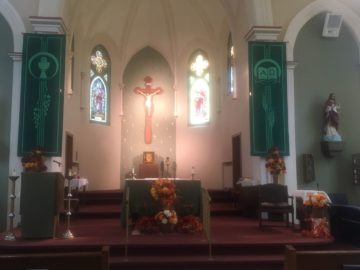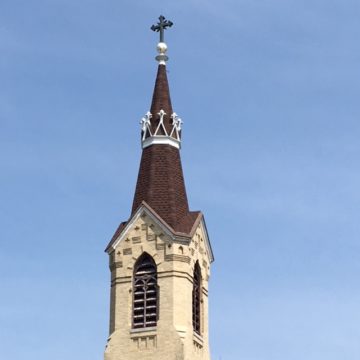As we seek a God who seeks us, we offer a Franciscan Gospel reflection and questions written by Fr. Paul Gallagher, OFM for your prayer. They are edited by Franciscan Sister of Christian Charity Sister Anne Marie Lom and Joe Thiel. The excerpts from the Sunday readings are prepared by Joe Thiel. To read or download the complete pdf with excerpts for your prayer, please click here: Franciscan Gospel Reflection November 3 2019. Excerpts are from the Lectionary for Mass for Use in the Dioceses of the United States of America, second typical edition © 2001, 1998, 1997, 1986, 1970 Confraternity of Christian Doctrine, Inc., Washington, DC. Used with permission. All rights reserved. No portion of this text may be reproduced by any means without permission in writing from the copyright owner. Photos: St. Mary Church, Clarks Mills, Wisconsin

Luke 19:1-10
He [Jesus] came to Jericho and intended to pass through the town.
Now a man there named Zacchaeus, who was a chief tax collector and also a wealthy man, was seeking to see who Jesus was; but he could not see him because of the crowd, for he was short in stature. So he ran ahead and climbed a sycamore tree in order to see Jesus, who was about to pass that way. When he reached the place, Jesus looked up and said to him, “Zacchaeus, come down quickly, for today I must stay at your house.”
And he came down quickly and received him with joy. When they all saw this, they began to grumble, saying, “He has gone to stay at the house of a sinner.” But Zacchaeus stood there and said to the Lord, “Behold, half of my possessions, Lord, I shall give to the poor, and if I have extorted anything from anyone I shall repay it four times over.” And Jesus said to him, “Today salvation has come to this house because this man too is a descendant of Abraham.
For the Son of Man has come to seek and to save what was lost.”
Background:
In the gospel text for last week, Jesus told the familiar parable of a Pharisee and a tax collector praying in the temple. Following that parable, Luke’s gospel tells of the disciples rebuking people for bringing children to Jesus. Jesus corrects them, “Let the children come to me…” (Luke 18:16b) Then an official approaches Jesus and asks what he must do to inherit eternal life. Jesus invites him to sell all that he has and become one of his followers. Luke does not tell if the official accepts his invitation, only that the invitation makes him sad because he had many possessions. But Jesus recognizes that it is hard for the wealthy to enter the kingdom of God. Jesus also reassures his disciples that everyone who has given up possessions or relationships for the kingdom will be rewarded. Then he takes the disciples aside and tells them of his own surrender that still awaits him when he is handed over to the Gentiles to be killed. Luke then tells of Jesus approaching Jericho and encountering a blind beggar as he enters the city. The crowd tells the beggar to keep quiet, but Jesus asks them to bring the beggar to him, and he restores his sight. This encounter with the blind beggar as Jesus enters Jericho leads into Luke’s description of his encounter with Zacchaeus up in the tree, which is the gospel text for this Sunday.
Luke generally portrays Jesus as being compassionate with the outcast and having harsh criticism of the wealthy. On August 4th (the 18th Sunday in ordinary time), the gospel included a parable about a rich landowner who had such a great harvest that he was going to pull down his barns and build larger ones so that he could eat, drink and be merry for many years. But God said to him, “you fool, this night your life will be demanded of you…” (Luke 12:20) Then back on September 29th (the 26th Sunday in ordinary time), the entire gospel encompassed Jesus telling the parable of the rich man and Lazarus. (Luke 16:19-31) Within the 28 verses between the text from last week and this week’s text, Luke presents Jesus welcoming the children, and asking the crowd to bring to him the blind beggar who was calling out to him.
In the gospel for last week, Jesus told a parable that held up the prayer of a tax collector as an example of the attitude that should be brought to our prayer with God. This week again it is a tax collector who is exemplified, the one whose desire to see Jesus is noticed in the midst of the crowd.
At the beginning of the gospel text, Luke states that Jesus was intending to pass through Jericho. The presumption is that he was not going to stop. The second verse introduces Zacchaeus, a leading tax collector of the area. He is wealthy, and short, and he seeks to see Jesus as he passes through town. Luke does not clarify his motivation, he just states that Zacchaeus wanted to see who Jesus was. He does describe the extent that he is willing to go to just to be able to see him. This short wealthy man climbs a tree high enough to be able to see above the crowd.
It is Jesus, presumably with the disciples and others from the town, who stops and engages Zacchaeus, inviting himself to dinner. Judging from appearances, Zacchaeus is a contemptible person. Tax collectors were people whose livelihood was obtained by collecting taxes for the Roman government. For the Jews, whose identity was tied to the fact that God had freed them from the slavery of Egypt, any reminder that they were not the free people that God had intended was painful. Zacchaeus is not only a tax collector, but he is the leader of a group of tax collectors. He is rich, which primarily means that he did not have to work for his daily survival. But here it also would imply to Luke’s audience that he was good at his profession. Contempt for him and his work leads the reader to presume he is “piled high” in his sinfulness. But that is only the external side of Zacchaeus.
Even before Jesus reaches Zacchaeus’ house, there is grumbling. It is then that Jesus learns what kind of a person he really is. Zacchaeus states that he gives half of his possessions to the poor. The tense of the verb here implies that this is ongoing regular practice. Next, he states that if he discovers that he has defrauded anyone, he would repay him or her 400%. The statement does not imply that he has defrauded, but he says if he learned that he had cheated anyone, they would be repaid. The Torah required that a person who defrauded another needed to return 120% of what was taken. Roman law required restoration of 400% only if the cheater was convicted. Zacchaeus has exceeded both standards of justice. Even though Zacchaeus is rich and powerful, he does not let his position prevent him from treating others, even the most vulnerable, with respect and fairness. Unlike the rich man who went away sad from his encounter with Jesus, Zacchaeus learns that “today, salvation has come to this house.”
There seems to be a new insight for us in Jesus’ final statement in the gospel, “For the Son of Man has come to seek and to save what was lost.” What was lost here is our awareness of God’s active presence in the life a person who appeared to be a contemptible sinner. If that is true for Zacchaeus, it may also be true for people with whom we live, or even for ourselves. Jesus reveals a God who desires to seek out and save whatever is lost, even in the most surprising places.
Reflection Questions:
1. When I become aware that there are people who are so wealthy that they do not have to work, I find myself…
2. How many incidents of Jesus eating with sinners, women, or outcasts can you recall?
3. Pretend that you are among the crowd walking with Jesus as he passes through your town. Why are you there? What is it you hope will happen?
4. Remain in that moment with Jesus and the others, and you notice Zacchaeus up in a tree. What thoughts and feeling are going through you?
5. Then Jesus stops and notices him and tells Zacchaeus that he should come down from the tree, and that he must stay at his house. What thoughts and feelings do you find welling up within you now?
6. Do you hear Jesus saying to you “I want to stay at your house?”
7. Have you ever risked looking foolish in order to express your desire to be in relationship to God, or others?
8. Where are the present day Zacchaeuses in your community? For what do you think they are looking?
9. Can you talk with Jesus now about why he said he must stay with Zacchaeus, how you feel about the “outcasts” in your community or family, or some other thoughts or feelings that arose within you from this gospel?



